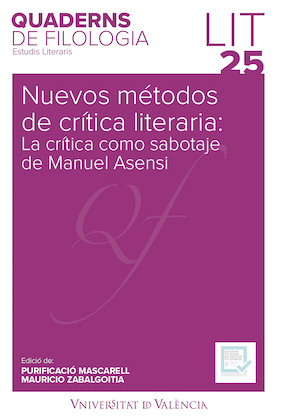Simultaneous parodies: criticisms of literature in the writings of Adolfo Bioy Casares, Jorge Luis Borges and Jenaro Prieto
DOI:
https://doi.org/10.7203/qdfed.25.18968Keywords:
parody, sabotage, semantic inversion, pragmatic evaluation, irony. Abstract
Abstract
This article informs the tendency of adopting what we will call ironic standings in Argentinian and Chilean literary circles during the early forties by way of contrasting the work of a Chilean author, Jenaro Prieto, with that of two Argentinians, J. L. Borges and A. Bioy Casares. The identification and exposition of this behavior is guided toward questioning parody as a tool and strategic means for Sabotage. In order to achieve this analysis, we will focus on the manifestation of a textual mechanism that is able, due to semantic inversion and pragmatic evaluation, to undo literary techniques and styles, and thus have an impact on the readership’s preferences.
 Downloads
Downloads
Downloads
Published
How to Cite
-
Abstract366
-
PDF (Español)296
Issue
Section
License
 Este obra está bajo una licencia de Creative Commons Reconocimiento-NoComercial-SinObraDerivada 4.0 Internacional.
Este obra está bajo una licencia de Creative Commons Reconocimiento-NoComercial-SinObraDerivada 4.0 Internacional.
Authors who publish with this journal agree to the following terms:
- Authors retain copyright and grant the journal right of first publication with the work simultaneously licensed under a Creative Commons Attribution License that allows others to share the work with an acknowledgement of the work's authorship and initial publication in this journal.
- Authors are able to enter into separate, additional contractual arrangements for the non-exclusive distribution of the journal's published version of the work (e.g., post it to an institutional repository or publish it in a book), with an acknowledgement of its initial publication in this journal.
- Authors are permitted and encouraged to post their work online (e.g., in institutional repositories or on their website) prior to and during the submission process, as it can lead to productive exchanges, as well as earlier and greater citation of published work (See The Effect of Open Access).




